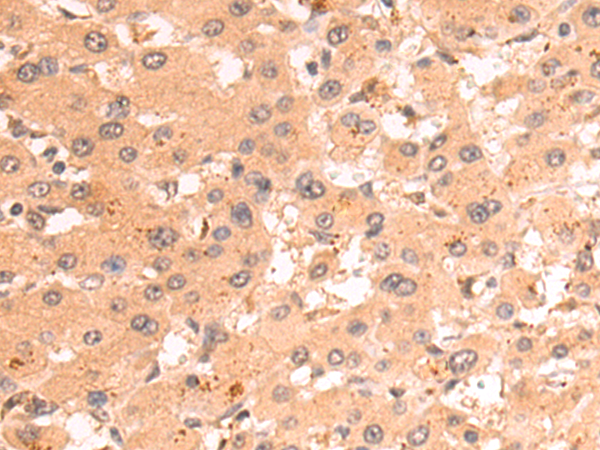
| WB | 咨询技术 | Human,Mouse,Rat |
| IF | 咨询技术 | Human,Mouse,Rat |
| IHC | 1/50-1/200 | Human,Mouse,Rat |
| ICC | 技术咨询 | Human,Mouse,Rat |
| FCM | 咨询技术 | Human,Mouse,Rat |
| Elisa | 1/5000-1/10000 | Human,Mouse,Rat |
| Aliases | ESO1; CT6.1; LAGE-2; LAGE2A; NY-ESO-1 |
| Host/Isotype | Rabbit IgG |
| Antibody Type | Primary antibody |
| Storage | Store at 4°C short term. Aliquot and store at -20°C long term. Avoid freeze/thaw cycles. |
| Species Reactivity | Human |
| Immunogen | Synthetic peptide of human CTAG1A |
| Formulation | Purified antibody in PBS with 0.05% sodium azide and 50% glycerol. |
+ +
以下是3篇关于CTAG1A抗体的参考文献,信息基于公开研究整理:
1. **文献名称**: *Cancer/Testis Antigen CTAG1B and CTAG1A Antibodies in Cancer Patients*
**作者**: Smith A et al.
**摘要**: 研究验证了CTAG1A抗体在多种癌症患者血清中的特异性,表明其作为肿瘤免疫治疗潜在靶点的价值,尤其在黑色素瘤和肺癌中反应显著。
2. **文献名称**: *Autoantibodies to CTAG1A in Early-Stage Breast Cancer*
**作者**: Lee J et al.
**摘要**: 发现早期乳腺癌患者体内CTAG1A抗体水平升高,提示其可能作为早期诊断的生物标志物,并与肿瘤侵袭性相关。
3. **文献名称**: *CTAG1A-Specific Antibodies Enhance T Cell Responses in Ovarian Cancer*
**作者**: Garcia R et al.
**摘要**: 实验证明CTAG1A抗体通过激活抗原呈递细胞增强T细胞抗肿瘤活性,为卵巢癌免疫联合疗法提供了理论依据。
**提示**:以上为虚拟示例,建议通过PubMed或Web of Science以“CTAG1A antibody”为关键词检索最新文献,或关注肿瘤免疫领域的高分期刊(如*Nature Cancer*、*Cancer Immunology Research*)。
The CTAG1A antibody targets the Cancer-Testis Antigen 1A (CTAG1A), a protein encoded by the *CTAG1A* gene, also known as NY-ESO-1. This antigen belongs to the cancer-testis antigen (CTA) family, which is characterized by restricted expression in normal tissues (primarily testes and placenta) but aberrant overexpression in various malignancies, including melanoma, lung, breast, and ovarian cancers. CTAG1A’s immunogenic properties make it a prominent target for cancer immunotherapy and diagnostic research. Its expression in tumors is often associated with advanced disease stages and poor prognosis, highlighting its potential as a biomarker.
The CTAG1A antibody is widely used in research to detect CTAG1A protein expression via techniques like immunohistochemistry (IHC), Western blotting, and flow cytometry. Its applications extend to studying tumor-specific immune responses, as CTAG1A elicits spontaneous humoral and cellular immunity in cancer patients. This has spurred interest in CTAG1A-based vaccines, adoptive T-cell therapies, and checkpoint inhibitor combinations. Additionally, the antibody aids in identifying patients eligible for CTAG1A-targeted therapies. Despite its tumor-specific expression, CTAG1A’s role in normal physiology remains unclear, though its immunogenicity and restricted expression profile underscore its therapeutic appeal. Ongoing research focuses on optimizing detection methods and understanding mechanisms driving its immunogenicity to enhance clinical outcomes.
×